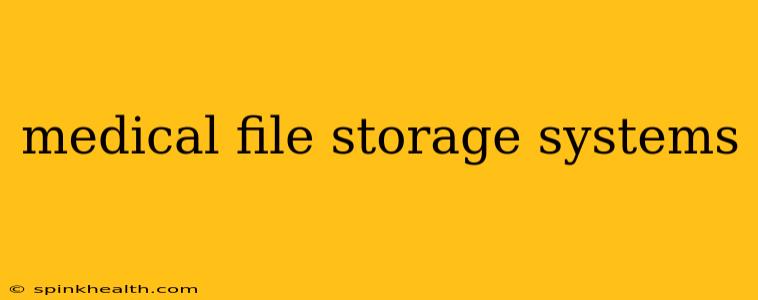The hum of the hospital, the quiet rustle of charts, the hushed urgency of a doctor's consultation – these are the hallmarks of healthcare. But behind the scenes, a critical battle is waged: the fight for efficient and secure medical file storage. In today's digital age, managing patient data is no longer a simple matter of filing cabinets and paper charts. It's a complex undertaking demanding robust systems that prioritize security, accessibility, and compliance. Let's delve into the world of medical file storage systems, exploring the options and challenges healthcare providers face.
What are the Different Types of Medical File Storage Systems?
Choosing the right medical file storage system is akin to choosing the right tool for the job. The ideal system depends heavily on the size of the practice, budget, and technological expertise. Let's examine the key players:
-
Paper-based systems: While seemingly outdated, paper-based systems persist in some smaller practices. They offer simplicity but lack the security, accessibility, and scalability of digital solutions. The risk of loss, damage, and inefficient retrieval outweighs the benefits for most modern healthcare settings.
-
On-premises servers: These involve storing data on servers within the healthcare facility itself. While offering greater control, they require significant upfront investment in hardware, software, and IT personnel for maintenance and security.
-
Cloud-based storage: This rapidly growing segment leverages remote servers to store and manage data. Cloud systems offer scalability, accessibility from multiple locations, and often incorporate robust security features. However, choosing a reputable provider with strong HIPAA compliance is paramount.
-
Hybrid systems: Combining elements of on-premises and cloud-based storage offers a balance between control and flexibility. Sensitive data may be stored locally, while less critical information can be housed in the cloud.
What are the Benefits of Using a Medical File Storage System?
The advantages of transitioning to a robust medical file storage system extend far beyond simple organization. Let's consider some key benefits:
-
Enhanced Security: Digital systems, particularly those utilizing encryption and access controls, offer superior protection against data breaches and unauthorized access compared to paper-based alternatives.
-
Improved Efficiency: Quick retrieval of patient records streamlines workflows, allowing healthcare professionals to spend more time with patients and less time searching for information.
-
Better Collaboration: Cloud-based systems facilitate seamless collaboration among healthcare providers, enabling efficient data sharing and improved patient care.
-
Cost Savings: While initial investments can be significant, efficient data management often translates to long-term cost savings through reduced administrative overhead and improved operational efficiency.
-
Compliance with Regulations: Robust systems ensure compliance with HIPAA and other relevant regulations, mitigating legal risks and penalties.
What are the Key Features to Look for in a Medical File Storage System?
Choosing the right system involves careful consideration of several key features:
-
Data Security: Look for systems with robust encryption, access controls, and audit trails to ensure data integrity and confidentiality.
-
HIPAA Compliance: The system must adhere to all HIPAA regulations regarding patient data privacy and security.
-
Scalability: The system should be able to accommodate growing data volumes and evolving needs.
-
Integration with EHR/EMR Systems: Seamless integration with existing Electronic Health Record (EHR) and Electronic Medical Record (EMR) systems is crucial for efficient data flow.
-
Disaster Recovery: The system should incorporate disaster recovery plans to ensure data availability even in the event of system failures or natural disasters.
How Secure is Cloud-Based Medical File Storage?
Cloud-based storage is often perceived with apprehension regarding security. However, reputable cloud providers invest heavily in robust security measures, including encryption, access controls, and regular security audits. The key is to choose a provider with a proven track record and a strong commitment to HIPAA compliance. Compare security features and certifications across different providers before making a decision.
How Much Does a Medical File Storage System Cost?
The cost of a medical file storage system varies widely depending on the size of the practice, the type of system chosen, and the features included. Cloud-based solutions often operate on a subscription model, with costs scaling based on storage capacity and user numbers. On-premises systems require a larger upfront investment in hardware and software, but may offer lower long-term costs for large practices. Obtain quotes from multiple vendors to compare pricing and features.
The transition to a modern medical file storage system is not just a technological upgrade; it’s a strategic investment in patient care, operational efficiency, and regulatory compliance. By carefully considering the various options and prioritizing security and accessibility, healthcare providers can create a robust foundation for efficient and secure data management.

